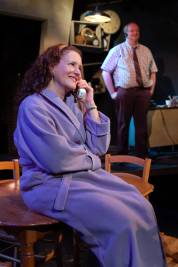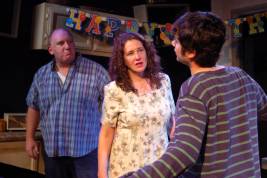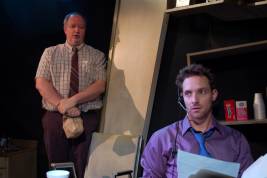
Mabel Davies is trying to make the most of her Midwest hell of a life in Timothy McNeil’s World Premiere drama Supernova—but it sure as hell isn’t easy. Her inattentive, loutish husband John spends his days plunked down in front of the tube before heading off to his graveyard-shift factory job, leaving Mabel alone at home to fend for herself. Son Kip used to be the apple of both his parents’ eyes, but as his eighteenth birthday approaches, the surly youth wastes his days and nights drinking, getting high, and spouting right wing militia catchphrases. (He’s also carrying on a secret sexual affair with the Davies’ recently separated next door neighbor Fran, twice his age.) No wonder Mabel finds solace in her nightly phone calls with Joe, a lonely watch salesman in far away California.
Reminiscent of the small town slice-of-life dramas of William Inge and Horton Foote, Supernova is a compelling, achingly real look at lives gone wrong—and one woman’s awakening to the possibility of escape.
Mabel first phones Joe upon finding a dog-eared ad for a $299 watch called the Supernova in a copy of Soldier Of Fortune her son has been reading. Despite the sky-high cost, she determines to buy it for Kip’s eighteenth birthday. Joe (playwright McNeil doing double duty) mans the watch company’s late night phone line, and though Mabel can’t seem to make up her mind to order the Supernova the first or even the second or third time she calls, something keeps drawing her back to the phone (and to Joe) night after night, call after call.
The watch does eventually get ordered, but the calls go on, providing both Mabel and Joe with the sole bright moments in their dreary days and nights. If only there were a way to make this happiness permanent—and no longer long distance …
Under Lindsay Allbaugh’s sensitive, nuanced direction and performed by an all-around superb cast, McNeil’s play unfolds like a 1950s/60s classic (think Come Back Little Sheba or The Trip To Bountiful), though its mid-1990s setting reflects a far more complicated world than Eisenhower/Kennedy-era families had to deal with. (You don’t see characters in Picnic or Bus Stop smoking pot or ranting about the liberal threat to white America, for example.)
Playwright McNeil’s choice of a ‘90s setting couldn’t be a more fitting backdrop. The then recent siege at Waco inspires Kip’s fear & loathing of the federal government and makes Tim McVeigh a hero in the rebellious teen’s eyes. A pre-Internet America makes Mabel’s isolation all the more overwhelming and her phone calls with Joe all the more magical and mysterious than an online chat would be, besides making a quick exchange of self-pics impossible. (In one of the play’s most touching sequences, Mabel asks Joe to describe himself to her so that she can picture him when she goes to sleep that night.)
Dialog is Supernova is so real, and performances so spot-on, that it’s easy to forget that these are actors and not real people on whose walls we’ve become flies.
You can still see traces of the pretty young woman Bonnie McNeil’s Mabel must once have been in the frumpily dressed Iowa housewife who’s long since given up taking care of her appearance. Heartbreaking in her ineffectual efforts to keep the peace between her warring husband and son, McNeil gives us a Mabel who miraculously hasn’t given up on hope. In her early awkwardness with phone friend Joe and later, in the way her entire face lights up when the two exchange confidences, McNeil’s work here is multi-layered and quite wondrous to behold.
Playwright McNeil matches his real-life spouse every step of the way in a performance so authentic that the Joe we see before us seems to have been picked out of a dingy Des Moines office cubicle and transported intact to the stage before us—paunch and all. Our hearts go out to this sad, lonely recovering alcoholic when his hotshot young supervisor chews him out for arriving late to work and poor Joe can only stammer out that buses in Albuquerque, where he used to live, always ran on time. Hardly your traditional leading man, McNeil (the actor and the playwright) lets us see Joe through Mabel’s eyes—through the eyes of love.
Like the McNeils, Edward Tournier seems not to be performing a role, so authentic is his teen angst, anger, and sexual appetite. Boyishly sexy in a way that would easily turn on the “middle-aged” neighbor lady and his pretty blonde classmate, both of whom he tangles tongues with, Tournier is as boorishly mean and violent as his oaf of a father, truly a case of the rotten apple not falling far from the tree. So completely does Tournier disappear into Kip’s skin that it seems almost impossible to believe this is the same actor whose wide-eyed innocence made his role in the much lauded Secrets Of The Trade such a charmer.
Supporting performances are all gems as well. Tony Gatto is frighteningly true-to-life as Mabel’s blue collar couch potato of a husband, rage and frustration boiling always just below the surface. As Fran, a terrific Gina Garrison is no sexual predator, but rather the conflicted victim of a marriage gone bad and a testosterone-driven teen. (She’s also way too youthful and sexy to deserve the “old” epithet that Kip throws at her.) James Pippi shows us the hint of kindness that occasionally peeks out from Joe’s work supervisor’s young hotshot exterior. Kelly Elizabeth and Joe Wiebe make strong impressions as the classmate Kip is fooling around with and the one he enjoys making a fool of.
The Caligari-esque angles of scenic designer Joel Daavid’s ingenious set (which manages to fit four separate locales into a small space without ever looking cramped) reflect the off-kilter lives of Supernova’s cast of characters, and the dark night sky which serves as a backdrop lights up (courtesy of Daavid, doing superb double duty here as lighting designer) with constellations and shooting stars. (The play is titled Supernova, after all.) Jack Arky’s sound design cleverly amps Mabel and Joe’s phone calls, and his original music provides a just-right soundtrack to McNeil’s bittersweet tale. Louis Douglas Jacobs’ costumes are precisely what these characters would have bought themselves at “the Walmart.” Kudos also to assistant director Tom Stanczyk, associate producer Tara Norris, and stage manager Shannon Simonds.
With far too much great theater around town for even the busiest theatergoer to catch, I’ve missed three of the last four Elephant Theatre Company’s World Premieres. (Sincere apologies to Artistic Director David Fofi.) I’m so glad I didn’t make it four out of five with Supernova. With the feel of a classic and the freshness of something brand new, this beautifully written, acted, directed, and designed play is another feather in the Elephant’s multi-feathered cap.
The Elephant Space, 6322 Santa Monica Boulevard, Hollywood.
www.plays411.com/supernova
–Steven Stanley
June 4, 2010
Photos: Joel Daavid







 Since 2007, Steven Stanley's StageSceneLA.com has spotlighted the best in Southern California theater via reviews, interviews, and its annual StageSceneLA Scenies.
Since 2007, Steven Stanley's StageSceneLA.com has spotlighted the best in Southern California theater via reviews, interviews, and its annual StageSceneLA Scenies.







 COPYRIGHT 2024 STEVEN STANLEY :: DESIGN BY
COPYRIGHT 2024 STEVEN STANLEY :: DESIGN BY